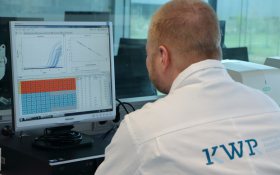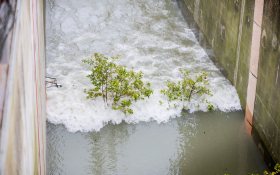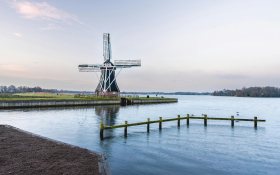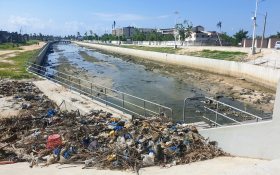WWF7: Global monitoring water quality: top down or bottom up?
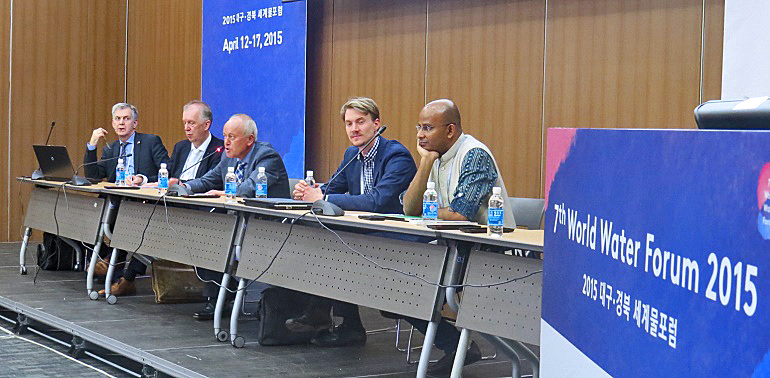
A global data system on the water quality has to be simple and accessible. So far the experts agreed at the monitoring session at the 7th World Water Forum in Daegu, Korea on 14 April.
The experts disagreed on the structure of such a system. Is it better to have a top down system with accountable and valued data for only a few experts. Or is it better to have a bottom up system with less valued data that is collected by local people that also use the data themselves?
The session Water quality monitoring from a global perspective was organised by the Netherlands Water Partnership.
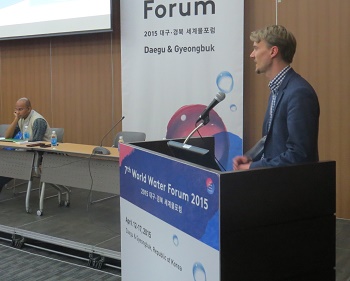 Phillipe Saile of the German Federal Institute for Hydrology explains the current status on global data centres that collect information on the quality of surface water.
Phillipe Saile of the German Federal Institute for Hydrology explains the current status on global data centres that collect information on the quality of surface water.
Finding the right balance
The United Nations are about to set a global target for water quality, calling for a 50% reduction of the discharge of all waste water by 2030. To track the progress of this target it is most obvious to monitor the effects of the envisioned additional waste water treatment, being the improvement of the quality of the receiving surface water.
This doesn't have to be the monitoring of 200 environmental relevant substances as is currently done for the Rhine river. There has to be a right balance, Koos Wieriks of the Dutch ministry of Infrastructure and Environment said in his introductory presentation.
Two major data centres for surface water
Phillipe Saile of the German Federal Institute for Hydrology explained the efforts that have already been taken by the World Meteorological Organisation (WMO) and the UN Environmental Programme (UNEP).
Saile told that two data centres already exist. UNEP has its Global Environment Monitoring System (GEMS) Water Data Centre collecting data from more than 4,100 stations, close to 4.9 milliollection systems were presented, showing how different the monitoring of water quality can be. Tjitte Nauta of the Dutch research institute Deltares told how his institute assisted the Singapore water authority PUB to install a very advanced system to monitor the water quality of the rivers, cannels and the marine bay. The system allows PUB to react quickly in case of an occurring water pollution.
Amitangshu Acharya of the non-profit IT-organisation AKVO told about the successful monitoring of the water quality in Africa by local people, using their cell phones. With small applications on their cell phones, the water quality can be measured and transmitted to an open data base where the data is mapped and shown on internet.
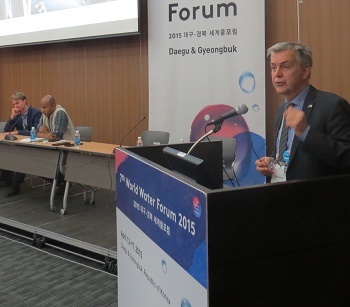 Tjitte Nauta of Deltares
Tjitte Nauta of Deltares
Ladder principle
A debate revealed that both systems have their advantages. The monitoring system operated by PUB Singapore produces verifiable data but is used by a few experts only. The monitoring system by AKVO produces less verifiable data but reaches many people.
Graham Alabaster of UN Habitat closed the session explaining that the GEMS data system is a good first start for global monitoring. He foresees that it will be difficult to link all the national data systems on water quality. Some national systems are very advanced and others are very basic.
Alabaster put forward the idea of a ladder where operators of data systems can jump in depending on the input that can be delivered.
Read also on this website
● WWF7: Buzzing Dutch delegation very active at World Water Forum in Korea, 21 April 2015
● WWF7: Be prepared for water-related disasters was key message Dutch delegation, 20 April 2015
● WWF7: Time for long term action plans as rare weather events become regular, 20 April 2015
● WWF7: Icomos recommends water heritage as inspiration for today's water management, 19 April 2015
● WWF7: Akvo Flow hits one million mark for field surveys, 18 April 2015
● WWF7: Dutch minister Schultz urges for consistent water policies to bring in the private sector, 15 April 2015
● WWF7: K-Water and Deltares sign MoU on joint projects on integrated water management, 14 April 2015
● WWF7: Korea and Netherlands take occasion of world forum to intensify cooperation, 13 April 2015
● WWF7: OECD launches 12 principles to achieve more stable water policies, 13 April 2015
● WWF7: Strong Dutch delegation joins World Water Forum with positive message: Be prepared, 9 April 2015
● Special website on Dutch participation at WWF7: www.wwf7.dutchwatersector.com
More information
www.worldwaterforum7.org
Deltares
Delft, the Netherlands
+31 88 335 8273
www.deltares.com
AKVO
Amsterdam, the Netherlands
+31 20 820 01 75
www.akvo.org
www.akvo.org
GEMS Water Data Centre
c/o Federal Institute for Hydrology
Koblenz, Germany
+49 261 13060
www.bafg.de
Video of the presentation by Amitangshu Acharya on the monitoring activities of Akvo.
